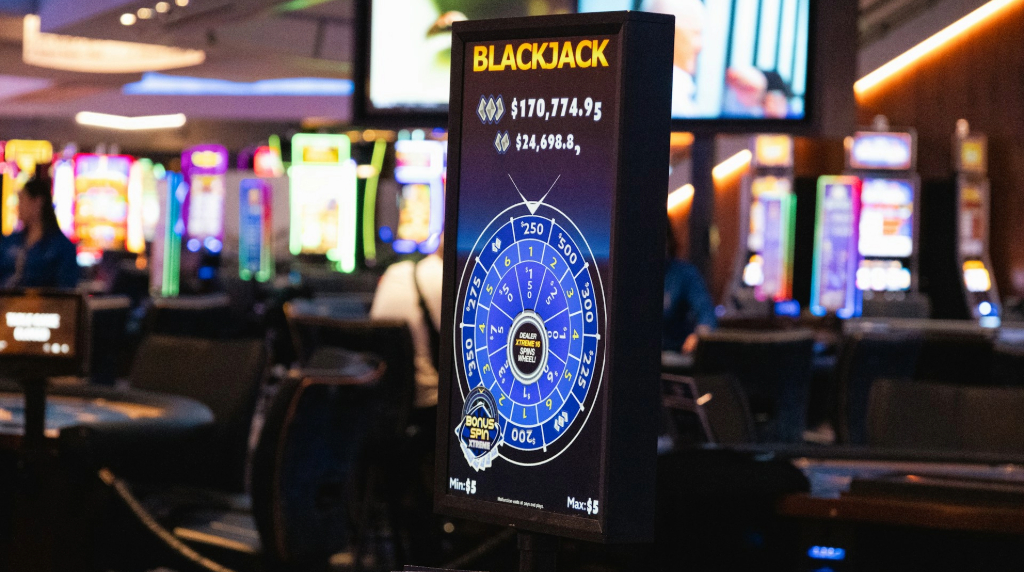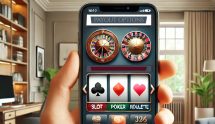The Table Games Revolution Is Finally Here: AI, Pits & Payouts
Most years, a new poker variant or a blackjack side bet might be the hottest new technology in table games. But in 2025, a revolutionary new technology is ready to transform the way we play and interact with tables games.

A combination of AI tech and smart camera mashup may soon change Table Games. © Vincent Yuan, Unsplash
Innovative Table Games
Suppose people mention innovative new technology in table games. In that case, you probably imagine something like Ultimate Texas Hold ’em with some new bets or a fancy new roulette reader board with catch-your-eye graphics.
And, hey, we get it. Table games have long lagged behind the slots department regarding innovation. Other than the occasional side bet or fancy table sign, many table games are the same as they were when they were played on riverboats headed up the Mississippi River from New Orleans or in private salons in Paris after the French Revolution.
The past couple of decades have seen the emergence of Carnival games, such as Caribbean Stud or Let it Ride, which can provide significantly larger payouts than the even money or occasional 3 to 2 found on blackjack, or even the 35 to 1 seen on roulette.
Progressive meters have enabled most table games to feature jackpot meters similar to those found in slots, which can pay out life-changing jackpots of hundreds of thousands of dollars for combinations such as three aces of spades or a royal flush, depending on the game. However, these feel like bolt-on bells and whistles rather than true table game innovation.
The Future is Now: Table Game Products of the Year
Then, in the past couple of years, we’ve seen companies like InterBlock roll out electronic table games, including what are called Dealer Assist Electronic Table Games. In this case, we still have centuries-old games like roulette or craps, but we can play them electronically for lower stakes with or without a dealer.
In the Dealer Assist Version of these games, we still have a human dealer to help move the game alongand add that feeling of excitement and empathy we get from playing with live dealers. However, these individuals often require considerably less training than an actual dealer.
For instance, the Smart Pit from InterBlock features a dice table with a “presenter” who acts as the stickman. The table and the dice are real. The dealer makes stick calls, pulls the dice into the center, and pushes them off to the shooter, but all bets are placed and paid on a terminal.
The shooter stands at the table when it’s their turn to shoot, but terminals and seats ring the table for players; even the dice are called by smart cameras that can read them and instruct the operating system to pay the bets.
This means that instead of having four highly trained dice dealers and a boxman to supervise. The casino may only need one presenter, who only needs to be able to push the dice out and make the occasional stick call.
Consider the complexity of the payouts, speed required, and the general temperament to be able to do all of this math flawlessly in your head while still providing excellent customer service. That’s why many Las Vegas Strip properties or other high-end casinos would never consider hiring a dice dealer without at least 5 years of experience dealing dice at smaller and less busy casinos.
Now, they can pay InterBlock to set up their fancy and disruptive gambling tech and hire a pretty face to push the dice. The same goes for games like roulette, where one dealer can now deal with dozens or even hundreds of people in a stadium-like setting.
It’s a live game, and they are spinning a real ball, but all of that chip stacking, bet pushing, and complicated payouts can become a thing of the past, handled by the computer.
And instead of one dealer for six players, you can have as many players to each dealer as you wish while offering three or four times as many spins an hour.
The same goes for baccarat as well, though blackjack can be a bit more problematic since, unlike roulette, baccarat, or dice, each player can make individual decisions about hitting hands or splitting or doubling.
Still, as the land-based casinos have learned from the live dealer games being dealt by online casino sites, there are procedures and policies that can be put in place that can remedy this though not yet beloved by the vast majority of Blackjack players.
These new innovative table game products replace costly and highly skilled dealers with “presenters” and, in most cases, allow one supervisor to oversee more tables. One dealer can deal to an almost unlimited number of players, and the computers ensure that all the math is quick and accurate.
While this gambling tech has caught on with younger generations over the past couple of years and continues to grow by leaps and bounds, many feel that it detracts from the aspects that make Table games great to begin with.
The camaraderie of a small group of players attempting to beat the dealer on tables that are much more traditional than those with electronic betting kiosks or those lacking real chips.
While the younger, more budget-conscious end of the table games spectrum will almost certainly continue to flock to dealer-assist live table games products, something more was needed to bring true table games innovation to those more discerning, higher-end table games enthusiasts who are the lifeblood of a successful table games department.
The Smart Table System
In 2025, we believe the Table Game Products of the Year list would not be complete without discussing Tavolo Tech. What Tavolo and other innovators are doing is changing not only the way we play table games but, more importantly, the way we are rewarded for our table games play, all while making tables less costly and more transparent for casino operators.
One of the biggest frustrations casinos have faced over the years is spending billions and billions of dollars on reinvestment. That’s just a fancy way of saying that we want you to come back and play; when you do, we want you to come back and play with us.
Some reinvestment at land-based casinos comes in the form of comped meals or free hotel rooms, and some can come in the form of gifts or show tickets. However, as the smart guys in the business will tell you, you can’t put a free toaster or tickets to see Wayne Newton back in a slot machine.
They like to ensure that you have a nice meal and a comfortable bed to rest your head in when you’re done gambling. However, they reward your play and loyalty with free play or, in the case of table games, free bets because of the chance to get that money back.
A straightforward formula is used to reward your play, including the house edge for the type of game you play, the number of hands you play, and how much you bet.
The problem is that those casinos are aware that, at least when it comes to table games, none of the billions every year they are spending to get you back in the door is based on data that is vague, estimated or just plain wrong. How much you bet? Some overworked floor supervisor watches eight tables with six players on each and eyeballs your bet, maybe every twenty minutes or so.
Number of hands played? We can guess and average, but we don’t have any real clue. So many things can impact this. Blackjack, roulette and craps, the number of hands played over an hour could be off by a factor 3x, maybe more; throughout your trip, that number could be even larger.
House edge? Yes, we know our exact house edge to four or five decimals compared to the best blackjack players in the world. We know precisely what our roulette game house edge will be, or baccarat. And we know what our advantage is on every one of the dozen bets on a craps table.
But what if you are a terrible blackjack player? What if instead of hitting twelve against a two or always splitting eights, you are over here doubling nines against a dealer ten or splitting fives against a dealer Ace? Every hand you play, you might be worth three or four times more than what is given you, but we have no way to know.
What if instead of playing the pass line with full odds, you are out there parlaying every hard way and throwing money in the field? Does the fact that the house edge is ten or twenty times higher on some of those bets than a pass line bet with 10 times the odds mean that you will be comped differently?
What about the side bet bettors or those who make the progressive bet every time? Some of those progressive bets have more than 20% house advantage. Some of those side bets are more than 10% in the houses’ favor. On a good double deck, the house might be making more off your $25 21+3 side bet than your two hundred dollar blackjack bet, but we’d wager you’re not getting credit for it.
But what Tavolo, and others like it, promise to make a reality, either this year or in the not-so-different future, is first the ability to get every player rated for exactly how much they bet every time and to know precisely how many wagers were made while that player was at the table.
And then to evaluate that play and instead of giving them some blended house edge based on the averages of all the different bets available or assuming they are the best blackjack player in the world who never makes an error, will instead base their reinvestments on actual house edge and their bets.
It will do that using AI and cameras mounted into the table screens that display the minimums and maximums as well as elsewhere that can read the number of chips in the betting circle, count the number of decisions per hour, and even decide if you’re the next card counter we kick out, or someone who plays so badly we need to move you into a suite.
More importantly, it will tie in many of the highlights of the Interblock Dealer Assist games. For instance, it can notify the dealer or the floor if the dealer makes an error and pays a hand they shouldn’t. It can calculate the amount that should be paid to the dealer on roulette to double-check if needed or inform them of the vig that needs to be taken out on baccarat.
It can inform management about the number of hands dealt in an hour, the number of mistakes made, and their type so they can develop a training campaign that addresses dealers’ particular weaknesses.
Perhaps you think that alerting to these mistakes doesn’t sound great for the player, but reducing errors and increasing profits for the casino means more reinvestment flowing back to the players.
We think any product that can finally give table games players the ability to be awarded for what they are actually worth. Speeding up games, eliminating errors, and cutting back on organized cheating scams will be a win-win for both gamblers and casinos and maybe even kick off a table game renaissance in the process.
In the race to modernize table games without giving up their souls, we think the AI based systems like Tavolo might be able to finally give table games players all of the rewards they deserve, and casino operators the effieceny they need to thrive, in what promises to be a fast paced new era of change and innovation.
 Reel Love: 5 Slot Games to Match Every Valentine’s Mood
Reel Love: 5 Slot Games to Match Every Valentine’s Mood
 Best Christmas Slots for 2025
Best Christmas Slots for 2025
 7 Politically Incorrect Slots for the Connoisseur Who’s Seen It All
7 Politically Incorrect Slots for the Connoisseur Who’s Seen It All
 Casino Payment Delay Red Flags: When Waiting Is a Concern
Casino Payment Delay Red Flags: When Waiting Is a Concern